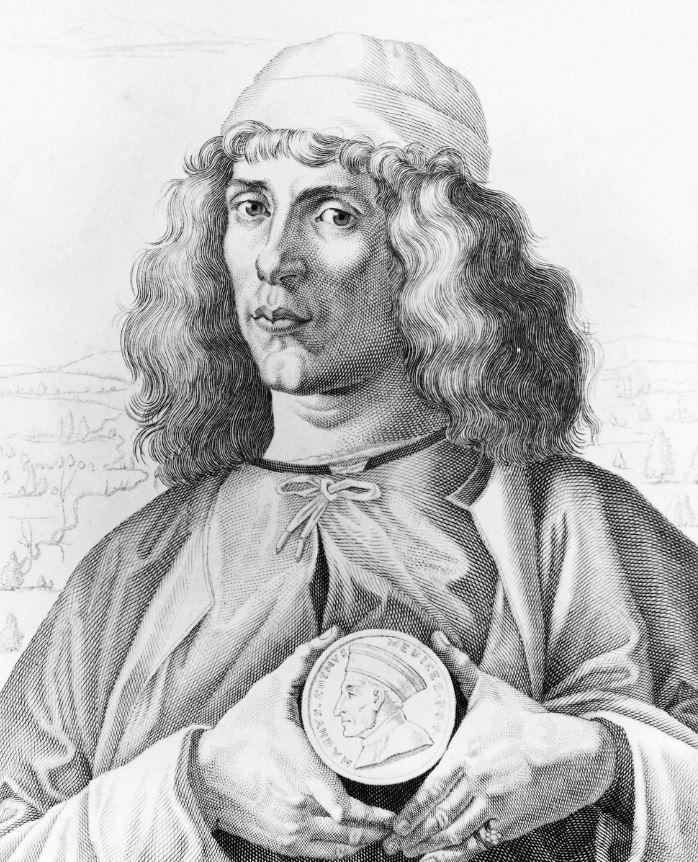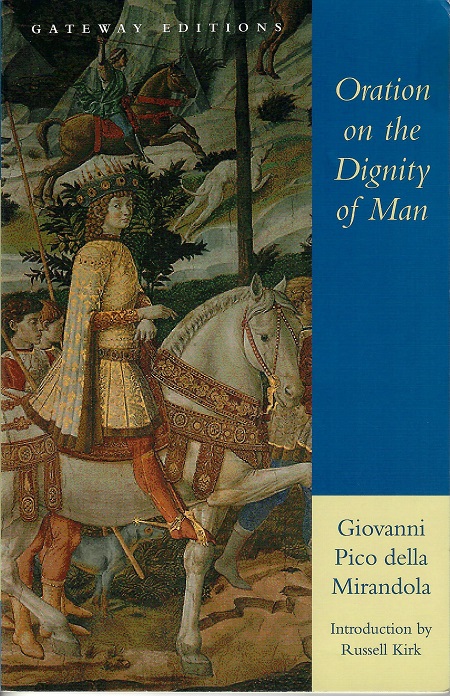
INTRODUCTION
Russell Kirk
“The enduring value of Pico’s work is due, not to his Quixotic quest of an accord between Pagan, Hebrew, and Christian traditions,” John Addington Symonds writes, “but to the noble spirit of confidence and humane sympathy with all great movements of the mind, which penetrates it.” Out of the bulk of the works of Count Giovanni Pico della Mirandola, who challenged the doctors of the schools to dispute with him on nine hundred grave questions, the only production widely read nowadays is this brief discourse, “The Dignity of Man,” delivered by him in i486, at Rome, when he was only twenty-four years old. The oration, which was his glove dashed down before authority, lives as the most succinct expression of the mind of the Renaissance.
Pico, a son of the princely house of Mirandola, one of the most brilliant of the great Renaissance families, studied at Bologna, and wandered through the Italian and French universities for seven years, becoming immensely erudite, proficient in Greek, Latin, Hebrew, Chaldee, and Arabic. Mystic, magician, and grand scholar, he combined in his character the Gothic complexity of the Middle Ages with the egoism and enlightenment of the Renaissance. He was the most romantic of all the Humanists. His immense design it was to effect a synthesis and reconciliation of Hebrew, classical, and Christian traditions. No one did more than Pico to restore Plato to dignity in the schools; yet, as Symonds observes, “uncontrolled by critical insight, and paralyzed by the prestige attaching to antiquity, the Florentine school [which Pico and Ficino dominated] produced little better than an unintelligent eclecticism.” Among Pico’s nine hundred questions were some propositions which hung close upon the brink of heresy. He thought that the secrets of the magicians could prove the divinity of Christ, and that the Cabala of the medieval Jews would sustain the Christian mysteries. Thus, haranguing, reading, wandering, preaching, commencing a vast work against the enemies of Christianity, he spent his brief life, dying of a fever before he was thirty—though he already had abjured the world and the flesh, and planned to wander barefoot as an evangelist.
Now this eccentric genius’ “Dignity of Man” is the manifesto of humanism. Man regenerate—“this, visibly,” Egon Freidell says, “is the primary meaning of the Renaissance: the rebirth of man in the likeness of God.” The man of the Middle Ages was humble, conscious almost always of his fallen and sinful nature, feeling himself a miserable foul creature watched by an angry God. Through Pride fell the angels. But Pico and his brother-humanists declared that man was only a little lower than the angels, a being capable of descending to unclean depths, indeed, but also having it within his power to become godlike. How marvellous and splendid a creature is man! This is the theme of Pico’s oration, elaborated with all the pomp and confidence that characterized the rising Humanist teachers. “In this idea/’ continues Freidell, “there lay a colossal hybris unknown to the Middle Ages, but also a tremendous spiritual impulse such as only modem times can show.”
The very Cherubim and Seraphim must endure the equality of man, if Man cultivates his intellectual faculty. It is the spirit, the spark of Godhood, which raises Man above all the rest of creation and makes him distinct in kind from all other living things. For all his glorification of Man, however, Pico has no touch of the modem notion that “man makes himself,” and that an honest God’s the noblest work of man. It is only because Man has been created in the image of God that Man is angelic. God, in his generosity, has said to Man, “We have made thee neither of heaven or of earth, neither mortal nor immortal, so that with freedom of choice and with honor, as though the maker and moulder of thyself, thou mayest fashion thyself in whatever shape thou shalt prefer. Thou shalt have the power to degenerate into the lower forms of life, which are brutish. Thou shalt have the power, out of thy soul’s judgment, to be reborn into the higher forms, which are divine.”
This, then, is the essence of humanism, which spread out of Italy unto the whole of Europe, reaching its culmination, perhaps, in Erasmus and Sir Thomas More. (More it was who translated the life of Pico by his nephew Giovanni Francisco into English.) God had given Man great powers, and with those powers, free will. Man might rightfully take pride in his higher nature, and turn his faculties to the praise and improvement of noble human nature. A world of wonder and discovery lay before the Renaissance humanist. Yet all this dignity of human nature was the gift of God: the spiritual and rational powers neglected—and through free will Man is all too able to neglect them—Man sinks to the level of the brutes. The humanist does not seek to dethrone God: instead through the moral disciplines of humanitas, he aspires to struggle upward toward the Godhead.
Thus a degree of humility chastened the pride of even the most arrogant humanist of the Renaissance. But the seed of hubris, overweening self-confidence, was sown; and a time would come when Man would take himself for the be-all and end-all; and then Nemesis would be felt once more, and The end, however, is not yet. It has remained for us of the twentieth century to look back upon the course of this hubris, diffused over all the world; and to see the oratorical aspirations of the humanists transformed into the technological aspirations of the modem sensual man; and to glimpse the beginning of the Catastrophe, perhaps, in a handful of dust over Hiroshima, or in the leaden domination of the Soviets, or in the pornography and hysteria of the corner news-stand. Robert Jungk, in Tomorrow Is Already Here, describes the stage of this progress at which we have arrived: “The stake is the throne of God.
To occupy God’s place, to repeat His deeds, to recreate and organize a manmade cosmos according to man-made laws of reason, foresight, and efficiency”—this is the ambition of the twentieth-century energumen of progress. And to gratify this ambition, we have moved very near to the dehumanization of Man. In our lust for divine power, we have forgotten human dignity.
By “the dignity of man,” Pico della Mirandola meant the high nobility of disciplined reason and imagination, human nature as redeemed by Christ, the uplifting of the truly human person through an exercise of soul and mind. He did not mean a technological or sensate triumph. “The dignity of man” is a phrase on the lips of all sorts of people nowadays, including Communist publicists; and by it, all sorts of people mean merely the gratification of the ego, the egalitarian claim that “one man is as good as another, or maybe a little better.” Pico, however, knew that no being can dignify himself: dignity is a quality with which one is invested; it must be conferred. For human dignity to exist, there must be a Master who can raise Man above the brute creation. If that Master is denied, then dignity for Man is unattainable.
For despite all the cant concerning the dignity of man in our time, the real tendency of recent intellectual currents has been to sweep true human dignity down to a morass of mechanistic indignity. Joseph Wood Krutch, a generation ago, in his Modern Temper, described with a sombre resignation this process of degradation. Without God, Man cannot aspire to rank with Cherubim and Seraphim. Freud convinced the crowd of intellectuals that Man was nothing better than the slave of obscure and arrogant fleshly desires; Alfred Kinsey, unintentionally reducing to absurdity this denial of human dignity, advised his fellow-creatures to emulate, if not the ant, at least the snake—for Man, so the modern dogma goes, lives only to lust. In this fashion phrases Unger on in men’s mouths long after the object they describe has been forgot.
Pico della Mirandola, Platonist and Christian and sorcerer and rhetorician and mystic, designed his nine hundred questions as an irrefragable proof of Man’s uniqueness. Emerson echoed him, five centuries after:
There are two laws discrete
Not reconciled,—
Law for man, and law for thing;
The last builds town and fleet,
But it runs wild,
And doth the man unking.
By a discipline of the reason and the will, to make Man kingly, even angelic—this was Pico’s hope, and it has been the hope of all true humanists after him. Thing, nevertheless, has run wild in our time, building town and fleet, bomb and satellite; and the Man has been unkinged; and human dignity is at its lowest ebb, now, when Man’s power over nature is at its summit. A real man, in any age, is dignified and nobly human in proportion as he acknowledges the overlordship of One greater than Man. If Things are to be thrust out of the saddle once more, and Man mounted (in Pico’s phrase) to “join battle as to the sound of a trumpet of war” on behalf of Man’s higher nature, then some of us must go barefoot through the world, like Pico, preaching against the vegetative and sensual errors of the time.
